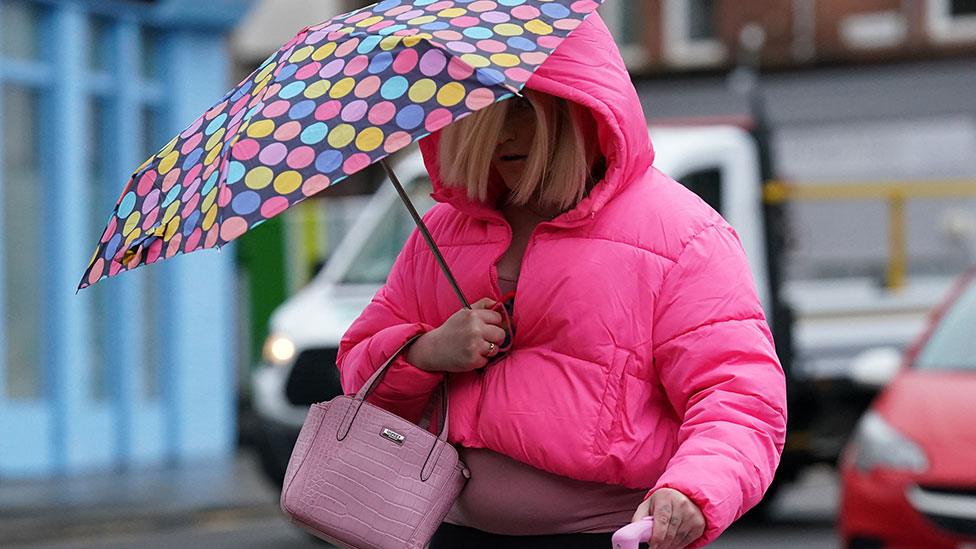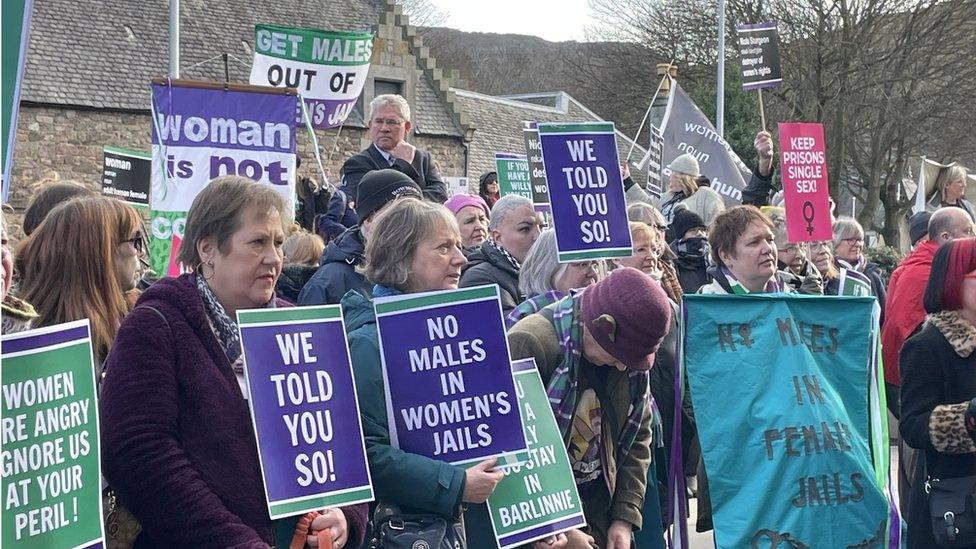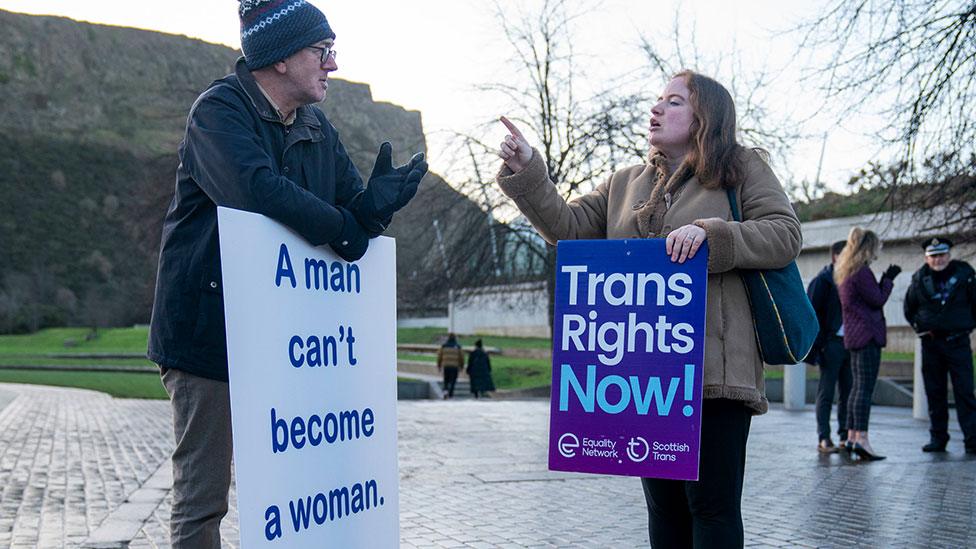Trans prisoners in Scotland to be placed according to birth sex
- Published
Justice secretary explains prison gender policy
Newly convicted or remanded transgender prison inmates will initially be placed in jails according to their sex at birth, the Scottish Prison Service (SPS) has confirmed.
The policy was confirmed in an urgent review which found a double rapist being placed in a women's jail did not put female prisoners at risk of harm.
However, the SPS said it received "conflicting" details on Isla Bryson.
It also called for an urgent review of admission rules for some inmates.
The investigation was ordered by Justice Secretary Keith Brown in the wake of a public outcry after Bryson was initially housed in segregation at Cornton Vale prison in Stirling.

Isla Bryson, a convicted rapist, was moved from Cornton Vale to a male wing at HMP Edinburgh
Bryson - who will be sentenced later this month for raping two women while she was known as a man called Adam Graham - was then moved to a male wing at HMP Edinburgh.
In an interview with BBC Scotland, Mr Brown initially said the rule applied only to transgender people convicted of violence against women.
But after an intervention from a member of his staff, the justice secretary clarified that all transgender prisoners will go into an assessment in a prison service facility which matches the sex of their birth.
He added: "That will very often be a process which is undertaken in a segregated environment, before an assessment is made as to where the person goes.
"And if it turns out the person has that history [of violence against women or girls] then of course they will not be going to, if they are a trans woman, to the female estate."
SPS chief executive Teresa Medhurst said in a letter to Mr Brown that was published alongside a summary of the Bryson case review that she had ordered an urgent review of all transgender women in Scottish prisons.
She said: "Until these reviews are complete, any transgender person currently in custody and who has any history of violence against women - including sexual offences - will not be relocated from the male to the female estate.
"In addition, any newly convicted or remanded transgender prisoner will initially be placed in an establishment commensurate with their birth gender."
Under guidance drawn up in 2014, the prison service says "accommodation provided must be the one that best suits the person in custody's needs and should reflect the gender in which the person in custody is currently living."
However an updated SPS policy from last month stated that no newly convicted or remanded transgender prisoner with a history of violence against women would be housed in female prison facilities.
The latest change means that transgender women will now automatically go to a male prison regardless of whether or not they have previous convictions of violence against women. They will then be assessed before a decision is taken on where to place them longer-term.
However, the review says that in "exceptional circumstances" a transgender person with a history of violence against women could potentially be relocated to or placed in a prison which does not match their sex at birth, with ministerial approval.

A protest against transgender women being housed in female prisons was held outside the Scottish Parliament on Thursday
The SPS review made four key recommendations to the Scottish government.
It found the prison service received "conflicting and limited information" about Bryson beyond the immediate convictions and said a "shared justice process" for the admission of transgender people to prisons should be considered.
The SPS also called for an urgent review of admission rules and improved communications about transgender prisoners from other justice sector organisations.
The report concluded SPS policy was followed in Bryson's case and said an individualised approach to risk assessments should continue.
"It is recommended that this person centred, individualised approach, which seeks to balance the rights of the individual with the risks they pose to themselves and to others continues and is encouraged," the report said.
Key findings and recommendations resulting from the review were published on Thursday, but Ms Medhurst said she believed it was "not necessary" to publish the full report due to the level of personal information it contains.
Scottish Conservative leader Douglas Ross urged the first minister to publish in full the review of the Bryson case at First Minister's Questions earlier on Thursday, with Ms Sturgeon pledging only to release the key findings.
Bryson was found guilty of raping two women in 2016 and 2019 in Clydebank and Glasgow before she changed gender.
The review into the handling of that case by the prison service was completed by the Scottish Prison Service last Friday, with a summary being made public on Thursday afternoon.
The SPS has also been conducting a Gender Identity and Gender Reassignment (GIGR) policy review, external since 2019 in response to concerns raised about welfare of people in its care.
Mr Brown confirmed the new policy on assessing transgender prisoners would remain in place pending the findings of the GIGR review.
In response to the Bryson report, he said: "All recommendations from the review have been accepted by Ms Medhurst as chief executive and will be progressed by SPS in collaboration with others as needed.
"As confirmed in the letter, SPS will factor the learning identified from this review into its GIGR policy review, which is ongoing."


At the heart of this case are two awful crimes and two women who were raped.
At points in the frenzy surrounding Isla Bryson those facts have been drowned out and so it is worth pausing to reflect what this fiasco must be like for the victims.
It is also a case which is having an impact on other women who are survivors of sexual violence and on trans people who feel unfairly stigmatised by some of the coverage.
That having been said, the handling of the Isla Bryson case has also been a huge headache for the Scottish government.
First Nicola Sturgeon stumbled when answering questions about what the case means for the principle of gender self-identification, which she has championed.
Then the Scottish Government was forced to clarify a misleading news release and the Justice Secretary struggled to explain precisely what the SPS was doing.
All of this is producing criticism from the SNP's opponents as you would expect but it is also generating frustration for many supporters of independence, worried that the rolling rows are damaging their cause.

- Published23 December 2022
